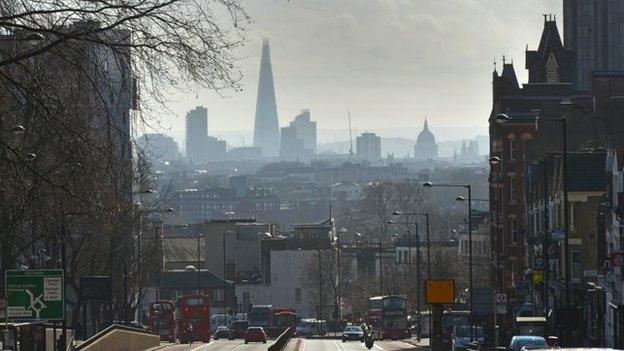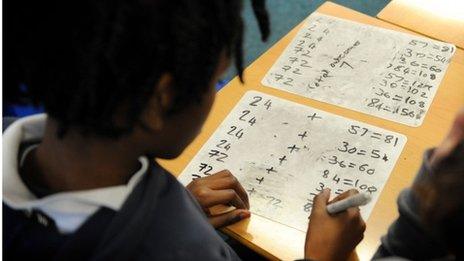A happy whodunit in London schools
- Published

We have a bit more information about London's rather astonishing school system. And, at first sight, it's a bit of a puzzle.
The Institute for Fiscal Studies has produced a piece of work covering from the late 1990s to the present that seems to confound older reporting, external (including, to declare an interest, a lot by me).
That is because it stresses that the improvement in schools might not have happened where we thought.
The summary says "the key new finding is that higher levels of achievement at... the end of secondary school... and improvements in results for disadvantaged pupils in London (and other big cities) can mostly be explained by improvements in [primary schools]".
It's awkward for those of us who have written a lot about the London Challenge, a support scheme to help schools, sponsor academies and Teach First.
None of those affected the primary schools in question at the right times.
Striking results
It is politically inconvenient too. Labour really talks up the London Challenge. The Tories are keener on sponsor academies.
But, in truth, the reason why secondaries look weaker in this new research is because of a curiosity about London schools.
To be clear, the results are correct, and very striking.
But, being an official report, it has to use official measures that reflect what schools were measured on. And that means it includes what are known as "equivalent qualifications" in the results.
These are largely vocational qualifications which, in the mid-2000s, were used by a lot of schools alongside GCSEs to boost their results - but not so much in London.
The city's schools did different qualifications - more GCSEs, fewer applied exams.
The IFS choice is perfectly fair, since London schools could have opted to take more equivalent qualifications, but you can correct for the decision of London schools not to.

You can, for example, look at a subset of qualifications only - ones that were offered in schools across the country.
If you do that, London's secondary schools suddenly look much better.
For example, I estimate that by looking only at grades in English, maths and the top-graded three other GCSEs (a measure once known as the "FT score"), you more than double the size of the London secondary school advantage compared with the metrics used by the IFS.
You can think of the IFS findings as showing that London schools do a bit better than the rest of the country, even when schools in the rest of the country were rushing to use vocational qualifications - many of which were just a quick way to rack up points on the league table.
The folk narrative of London school improvement has been fundamentally changed.
Something astonishing
That is because whatever measure you choose, it is clear that something astonishing was happening in London primary schools.
So the improvement was bigger than we thought, happened earlier than we knew and it doesn't overlap with any great policy drives.
So what is it? Maybe London's local authorities need a bit more credit. Maybe, as I've written before, London schools are reliant on romance.
Maybe, as the IFS report notes, the city is just becoming more attractive to well-educated people and the schools are benefitting. Who knows?
Still, it's a rather happy whodunit.
- Published23 June 2014

- Published16 June 2014